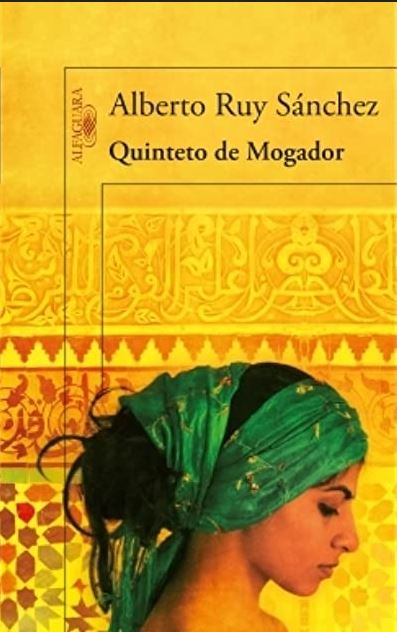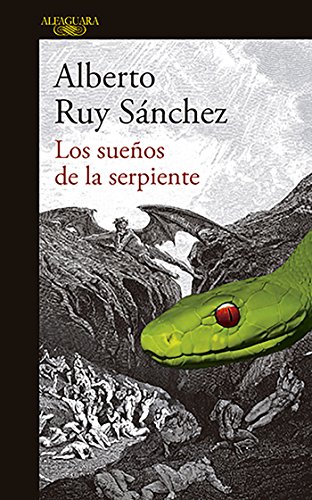scholar of Octavio Paz but also heir to his prose and his verse. The Mexican Alberto Ruy Sanchez He provides us with those happy reunions with literature when one of his new books loaded with plot surprises and formal inquiries appears.
Recurring scenarios on many occasions regarding that Mexico of impossible balances between tradition and avant-garde, between political factions and people. Commitment to writing a novel that takes us into great intrastories or essays that discuss the sociological, the political or "simply" the human.
The most evident authenticity of the writer is the unpredictable cadence marked by that something to tell. In the case of Alberto Ruy Sánchez, we enjoy that writer who finds the stories that should be narrated when they arise. From that conviction of opportunity, only works full of commitment, tenacity and, in short, inspiration can emerge...
Top 3 recommended books by Alberto Ruy Sánchez
Mogador Quintet
There are places suspended in the emptiness of the sea, rooted only in its abysses. It may be the island that bears this name or just a metaphor for solitude facing the sea. Always waiting for shipwrecks capable of breaking like foam from a nascent Venus at each new high tide. Because only the islands know how to be born and reborn like no other, give life with a feminine essence and yearn for that love that disappears once captive.
Essaouira or Mogador, a marine city, walled and labyrinthine, a city of dazzling beauty, desirable, desiring and never truly possessed, a metaphor for the search for love and at the same time for the woman he loves. But does Mogador really exist or, as some claim, is it the name of a woman described as a port? Why do they say that she always seduces but is never fully possessed?
Desire is drawn in Mogador with five colors or five elements: air, water, earth, fire and the quintessence, wonder. The five books that make up the Mogador Quintet -Nine times the wonder, The names of the air, On the lips of the water, The secret gardens of Mogador and The hand of fire-, brought together for the first time in a single volume, build a microcosm in whose center beats the search for love and, at the same time, for the beloved woman.
“Air devoured by water that absorbs the earth and its gardens, that fire greedily consumes. Seen as a whole and with amazement, she thinks, looking around the spiral circles of the Mogador Quintet, this room of tiles and calligraphy that we have built is like a machine to help us live and think about desire. A place where a thousand and one stories, revelations and ideas have been woven together for more than twenty years. And one can wander between the circles and the pieces with enormous ease. The pleasure of reading in fits and starts, looking at random, listening for pleasure as we please from everything they offer us.»
The file Anna Akhmatova
Every existence is a file to shred for the narrator on duty. The question is to paste those pieces of life left between memories, testimonies and even legends. Everything makes up the essence of a character. In the hands of Alberto Ruy, the leading role of Anna Ajmatova takes on that life between the fictional and the chronicle in a balance as juicy as it is exciting.
For Anna, finding her voice was the only possible way to be in the world. She never imagined the effects of her subtle and sharp poetry on so many different people. This is the story of the whirlwind of passions that she unleashed in each of them. From the envy of the most powerful and vengeful man of her time to the tormented admiration of the woman in charge of watching over her and betraying her.
From the city of St. Petersburg before the Revolution, as if in a theater of wonder, we become witnesses of his complex relationship with the creators of his time and, above all, with the most renowned poet of his generation, Nicolai Gumilyov, his first husband, murdered in 1921, in one of the first mass trials of innocents planned by Lenin and that would become recurrent in the years of Stalinist terror. A decade earlier, she herself tells us her intense and brief love story, in Paris, with Amedeo Modigliani. Collage novel, documentary novel, dossier of facts and rumors written with poetry retained on small sheets of birch bark, as was done in the gulag. A novel about the power of words.
The serpent's dreams
Having reached an age, it seems that life does not give for more. Many memories, debts, longings and few goals. The prospect of dementia may then seem like an existentially provoked procedure rather than a physiological or neuronal deterioration. Or perhaps it is these, our neurons that end up providing their last great service and end up blurring everything, like a hard drive formatting.
But sometimes there are dysfunctions in this degenerative process of self-destruction towards the recovery of the ultimate happiness, childhood ignorance. It may be the case of the protagonist of this story, a centennial patient of a psychiatric hospital who wants to continue remembering and who sketches on the walls the drawings of his uncontrollable flash back about what he was.
The reader soon understands that the erasure of information in this case threatens a transformative truth or an interesting schizophrenia. Who knows? Everyone's personal history has its subterfuges, tunnels drawn by memory to justify what we have been or where we have arrived. The best analogy is that of a snake that never senses the best path to its intentions on the straight path.
That our protagonist was a kind of wetback who had arrived in the United States and had known certain vicissitudes of the exiled Trotsky and persecuted until his murder could be coincidental. That life finally led him to the Soviet Union to work in a manufacturing plant that sought to implode the Cold War with the transfer of information from a disenchanted Henry Ford.
They are his memories, they are a hundred years of life. Wisdom is presupposed by an old man who lived his apotheosis in the middle of the XNUMXth century and who has had the fortitude to reach the XNUMXst with the desire to relate his life in his sketches of ancestral man. Sometimes a centenarian man sinks into his dark well and at other times his eyes shine again when he meets a truth lifted from the depths of his memory.
Alberto Ruy Sanchez He uses this character to narrate his own historical essay. The snake of thoughts and dreams, with its zigzagging advance, accompanies the passage of history from a personal perspective. History can insist on justifying and motivating everything, unreason, the most contradictory drives and the spirit of vainglory take care of writing reality after the official truth.
History tries to bear witness to the changes, its writers and interpreters pretend to make science of the process. The serpent knows that the road must always be winding, in the face of man's determination for the straight line as the shortest way.



